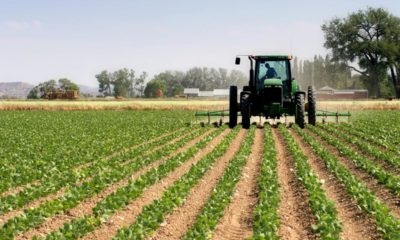Despite various measures to encourage local production, a total of about N117 billion (or $247.91 million) was expended on fertiliser importation in the past year.
Fertiliser imports increased by $37.71 million in 2019 to $247.91 million last year, representing an increase of 84.4 per cent.
Data by the International Trade Statistics (ITS) on imports showed breakdown of imports, according to country of origination to include Morocco, $128 million; Russia, $83.37 million; China, $17.15 million and Germany, which exported $11 million.
During the period, data by the Nigerian Ports Authority’s (NPA) shipping position shown three vessels offloaded 64,255 metric tonnes of fertiliser at the Lagos Port Complex.
The bulk of fertiliser was offloaded by at Apapa Bulk Terminal Limited (ABTL) and ENL Consortium terminal at Lagos Port Complex by three vessels.
At ENL terminal, MV Saros B offloaded 11,255 tonnes of the input, while Wariya Naree and Cengiz Bay discharged 42, 000 tonnes and 11,000 tonnes at the port.
In 2017, Nigeria imported 957,000 metric tonnes of the products through the ENL Consortium Terminal at the Lagos Port and JosepDam Terminal in Tincan Island Port.
The Federal Government had planned to save $1.2 billion yearly when it was discovered that the country’s plants have the capacity to produce over four million tonnes of Nitrogen, Phosphorus and Potassium (NPK) fertiliser yearly, while highest quantity being utilised by farmers was 1.5 million tonnes.
However, only N164 billion (or $350 million) had been saved from payments on subsidy and import substitution through the implementation of the Presidential Fertiliser Initiative (PFI).
Managing Director, Nigerian Sovereign Investment Authority (NSIA), Mr. Uche Orji, said the Presidency had approved the restructuring of PFI, starting in this year’s cycle with various modifications, following the successes recorded over the past four years.
Under the modifications, the NSIA was transitioned to an upstream player, thereby limiting its involvement to importation, storage and the wholesale of raw materials to blenders.
According to him, blenders would no longer be paid blending fees by NAIC-NPK, noting that they would recover their costs from selling the fertiliser to the market.
The blending plants are expected to provide bank guarantees to cover requisitioned raw materials demand that are appropriated for their respective production volumes.
Also, in line with the Presidential directive, the Federal Ministry of Finance Budget and National Planning and the Central Bank of Nigeria (CBN) are expected to engage commercial banks to facilitate lines of concessionary credits to blending plants for the purchase of raw materials and other equipment necessary for its production.
He stressed that 41 blending plants had been resuscitated from the initial four plants at project inception.
In addition, Orji said an estimated 250,000 direct and indirect jobs had been created across the agriculture value chain, including in logistics, ports, bagging, rail, industrial warehousing and haulage.
It would be recalled that in 2019, the Central Bank of Nigeria (CBN) had warned that no foreign exchange should be made available for funding fertiliser imports, noting that any company that imports the product would be sanctioned.
In the memo dated January 30, last year, signed by Director, Trade and Exchange Department, Mr. A. S. Jibrin, the apex bank reminded authorised dealers and the public that the ban on NPK fertiliser and any other variant remained in force.
When the order to ban importation of NKP to encourage local blending plants was introduced, the country in the immediate year saved N104.3 billion (or $285.9 million) in 2019.
Indorama Eleme Fertiliser and Chemicals and Dangote Petrochemicals and Fertiliser have already invested $4.5 billion to improve and boost the country’s fertiliser industry.
Dangote is expected to boost production by 2.8 million tonnes of fertiliser, while Indorama anticipated to produce1.4 million tonnes.
In 2016, Nigeria and Morocco had signed a memorandum of understanding (MoU) to help the former revive its ailing fertiliser industry through the supply of phosphates for local blending.
The MOU was consummated in 2018 during the visit of President Buhari to Morocco and had helped to revive 28 of the country’s comatose companies, which were primed to increase Nigeria’s production capacity.


 Naira4 weeks ago
Naira4 weeks ago
 Naira4 weeks ago
Naira4 weeks ago


 Naira4 weeks ago
Naira4 weeks ago




 Naira3 weeks ago
Naira3 weeks ago
 Commodities4 weeks ago
Commodities4 weeks ago


 News4 weeks ago
News4 weeks ago


 Banking Sector4 weeks ago
Banking Sector4 weeks ago
 Travel4 weeks ago
Travel4 weeks ago



















